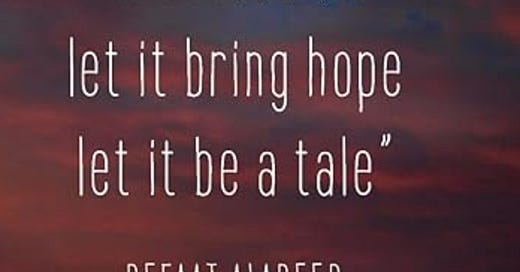I realized recently in my haste to urge our audience to buy Refaat Alareer’s book of poetry and prose, “If I Must Die,” in order to send a message to the Palestinian people that they aren’t forgotten, I’ve neglected to say much about the book itself. I was given an advance review copy, and I can say confidently it’s a stunning work from beginning to end, one of the most powerful literary documents I’ve read. Writer and poet Karthik Puru had a similar reaction, and reviewed the work for us. His review, which will give you a good sense of the book, is below.
The campaign to make it a bestseller still has momentum. It cracked the top 50 worldwide and hung there for a full day, a remarkable achievement for a book of poetry, and is now hovering at around 130. If you haven’t yet pre-ordered it, please do. If you’ve ordered a copy but you can think of friends or family who should read it, please go and get an extra copy. We have one more day to make this a bestseller.
You can get it from an indie bookseller at Bookshop.org.
Or get it here to boost the Amazon ranking.
Royalties from the book go to his surviving family, and we have nothing to do with the publication of the book. This is just something we want to see happen.
Portrait of the Artist as a People’s Historian
By Karthik Puru
One year and two months into the acceleration of the Israeli military’s ethnic cleansing campaign that major U.S. literary institutions still refuse to call a genocide, late Palestinian poet Refaat Alareer’s posthumous work If I Must Die (OR Books) comes not requesting recognition, but instead raising the bar for what it means to be literary in the current moment. Released to mark the anniversary of Alareer’s targeted killing, the book is a work of digital and oral history compiling the former Islamic University professor’s poems, editorials, articles, lectures, and interviews from the last decade-plus of his life, which together read like an epic poem chronicling the life of a man of his people.
The book emerges a call to action rather than a mere commemoration. Named for Alareer’s viral poem, the book’s (arguably even the poem’s) core driver is a quote from Nigerian author Chinua Achebe: “Until the lions have their own historians, the history of the hunt will always glorify the hunter.” When living in a time when many deny that the hunt is happening and are calling it a “conflict,” how do the lions counter the narrative? The book’s answer is ask the reader to take a simple action: to ensure that the story of his people reaches far and wide—an internationalist collaboration, laughing in the face of the oppressor. This is the simple reason Alareer wrote in English and not Arabic.
From Wilfred Owen in 1917 rhetorically asking, “What passing-bells for these who die as cattle?” to Kevin Powers in 2014 directly stating, “War is just people making little pieces of metal pass through each other,” contemporary Anglophone antiwar poetry and literature has largely been the purview of conscientious objectors and soldiers who fought in wars and either succumbed or got disillusioned. The imperialist invasions of the U.S. coupled with national liberation struggles worldwide in the latter half of last century, however, saw survivors of displacement, persecution, and torture enter the American lyric by offering what poet and activist Carolyn Forché terms a “poetry of witness” that serves as “evidence of what occurred,” while being “as much about language as are poems that have no subject other than language itself.”
While the western literary world has nevertheless confined itself to Irish poet Seamus Heaney’s somber observation that “no lyric has stopped a tank,” Alareer turns the Nobel Laureate’s remark on its head in a crucial essay in If I Must Die. He brings up legendary Palestinian poet Fadwa Tuqan as he asks, “Why would Israel arrest somebody or put someone under house arrest, she only wrote a poem?” Not only does he then go on to clarify that an Israeli general is on record equating the late great Tuqan’s poems with “facing twenty enemy fighters,” but he also recognizes how important literature was to the legitimization of the pre-1948 Zionist project. “Don’t forget that Palestine was first and foremost occupied in Zionist literature and Zionist poetry,” he writes.
So, in his poetry as well as prose compiled in If I Must Die, Alareer creates the counternarrative by daring to imagine a free Palestine as much as caring to portray the realities of Gaza getting destroyed in front of him. On one hand, the life of the Shujaiya native who went back home after graduate studies in London and Malaysia traces a tragic throughline that saw him lose family and close friends to the IDF’s terror campaign from 2008-09’s Operation Cast Lead (or “The First Gaza War”) through 2014’s Operation Protective Edge down to the ongoing Operations Swords of Iron and Summer Camps. On the other hand, the narrative Alareer stitches together is one of rugged resilience, unbounded optimism, and most importantly, fierce collectivism of large, interlocked families determined to outlast the occupying power on their land.
Alareer’s work also serves as a blueprint for political artists worldwide. If I Must Die as Alareer’s debut self-authored work—after two edited volumes Gaza Writes Back and Gaza Unsilenced—coming out after his death in what would have been his forty-sixth year on the planet speaks to literary decisions he made due to the urgency of Palestinian resistance to genocide. Crafted with such meticulous detail as if recorded by bodycam, Refaat’s dispatches offer the poet’s most intimate and vulnerable thoughts, yet notably absent from his portrayal is a sense of an artistic self as separate from family, neighborhood, and community. The fluidity with which he switches between first and third person narration allows Alareer at once to present his subjectivity and be a camera — sometimes a literal one, filming whatever is in front of him. Appropriately so, as Israel’s siege of Gaza meant so many of his close relationships were mediated by video and text messages. Consequently, one of the book’s more poignant insights into Refaat is offered not by him but a friend, Susan Abulhawa, the author of the book’s foreword, who recounts a video he had sent her three days before his assassination. In the clip, he’s showing her the remains of his home after it was bombed. His library has been destroyed, and the first thing he picks up is the book Gulliver’s Travels, which he had read multiple times. “In vain he tries to knock off the dust and debris, but he carries it with him nonetheless,” she writes.
The multitudes that Refaat’s prose as much as his verse contains are not schizoid conflicting individualisms within him, but the subjectivities of the likes of Hamada, his younger brother who was killed in an airstrike; of Mustafa Tamimi, a 19-year-old who was killed by a tear gas canister; even of International Solidary Movement activist Vittorio Arrigoni, an Italian citizen who was killed by Al-Qaeda. Together, these and other perspectives that are systematically getting edited out of world history as of this writing, come together to paint a picture of hope that continues to remain undefeated simply for the reason Alareer lays bare in If I Must Die—the hope derives not from a strongman leader or even a liberation army, but is in the hearts of everyone contributing to Palestinian resistance. Both this indestructible hope of people in Gaza and the unfettered cruelty of the occupying power comes to a climactic moment in the book at 2018’s Great March of Return that felt “like Palestine is free and people are finally returning back,” of which, Alareer writes, he was not only a part but also watched occupation snipers pick people out at random from a crowd of 100-150,000 unarmed protestors, extinguishing all prospects of peaceful resistance from thereon.
“Not even David’s sling could get the stones over the border,” Alareer said, his dark humor intact in his recounting to Electronic Intifada at the time, as he addressed IDF claims that the snipers fired in retaliation to protestors throwing rocks that could never have reached them. His deployment of gallows humor to alienating effect reminiscent of Bertolt Brecht establishes Alareer as a model twenty-first century anti-imperialist voice opening the reader’s eyes to the absurdity of the mainstream narrative that’s keeping the west in the Zone of Interest. After recounting the tragedy of losing thousands, including family members, to IDF atrocities over two decades, going back to the second intifada, Refaat ends the 2022 article “Gaza Asks: When Shall This Pass?” by invoking Shylock from the Shakespeare play Merchant of Venice not only to convey that he was able to get his Islamic University at Gaza (IUG) students to empathize with the character, but also to sardonically point out that the student essays comparing Shylock’s plight with that of Palestinians was destroyed in an IDF airstrike that flattened the IUG administrative building.
Those who know the story of his assassination need no introduction to the idea that Alareer’s Twitter activity made him a target, especially his derisive post mocking the now-debunked “babies baked in ovens” claim about the happenings of October 7. Even renowned opponents of “cancel culture” acted oblivious to a joke meant to expose the lie and treated it as a barbaric remark, with news media distastefully bringing it up any time they discussed his killing. None of that smearing and fearmongering meant much to an artist who knew he was about to die, choosing to go out telling the truth out loud to whoever listened. He was fully aware that the drone striking his home wouldn’t care about the words he said but would be hitting based on electronic signal just to shut him up.
If I Must Die depicts an artist putting a target on his own back by yelling the truth about his people out of a bullhorn at an occupier rendered deaf by the noise of its own machine gun (to borrow his words), just so his nation can live to fight another day.
Karthik Puru is a writer and musician from Chennai, India, who lives in New Jersey. His work has appeared in LA Review of Books, Poetry Foundation, Jacobin, the Baffler, the New Republic, the Wire (India), and Hyperallergic, among other places.







THANK YOU SO MUCH for starting the campaign for refaat's work. i bought a copy and recommended the book to friends as well. as to sales ratings ...
i am really writing this comment to lament people's beholdenment to, i.e. their heavy, carefree dependency on the multinational tech giant named A..., after the largest river on earth, headed by B..., one of the richest men on earth, and providing C..., cozy comfort to its customers while also causing big harm to people and the environment - not to mention its contributions to the US war machinery.
people who can afford A...'s services readily tolerate their harmful side effects *) in exchange for so much everyday luxury that comes at immense costs for others much less fortunate ...
______________
*) is our comfort really worth the price of modern slavery, exploitation, environmental destruction, support for warfare, among other things? [i thoroughly don't think so.]
The Israelies have ignited worldwide anti-semitism for a very long time.
[ordered]